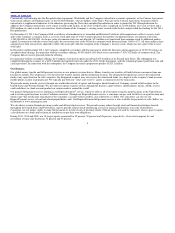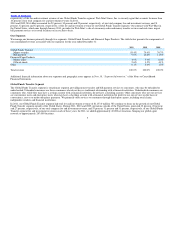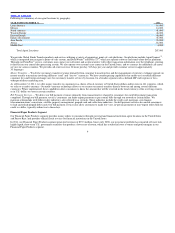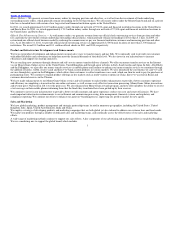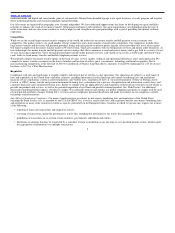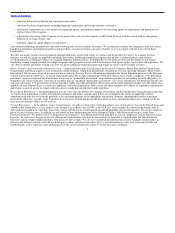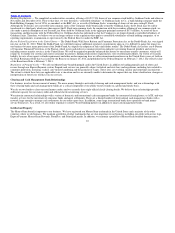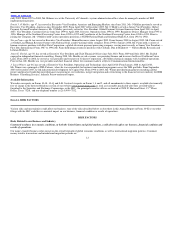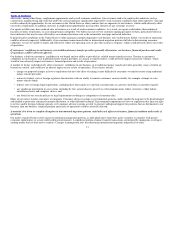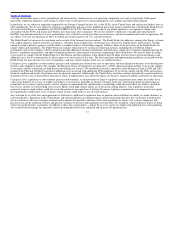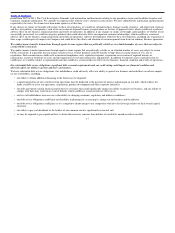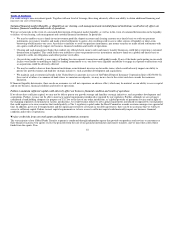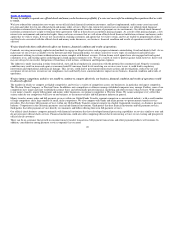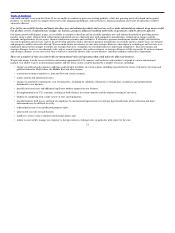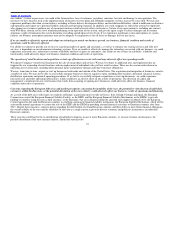MoneyGram 2011 Annual Report Download - page 15
Download and view the complete annual report
Please find page 15 of the 2011 MoneyGram annual report below. You can navigate through the pages in the report by either clicking on the pages listed below, or by using the keyword search tool below to find specific information within the annual report.
Table of Contents
events (such as war, terrorism or health emergencies) that make it more difficult for individuals to migrate or work abroad could adversely affect our money
transfer remittance volume or growth rate. Sustained weakness in global economic conditions could reduce economic opportunities for migrant workers and
result in reduced or disrupted international migration patterns. Reduced or disrupted international migration patterns, particularly in the United States or
Europe, are likely to reduce money transfer transaction volumes and therefore have an adverse effect on our results of operations.
If we lose key agents or are unable to maintain our Global Funds Transfer agent or biller networks, our business, financial condition and results of
operations could be adversely affected.
Revenue from our money transfer and urgent bill payment services is derived from transactions conducted through our retail agent and biller networks.
Many of our high volume agents are in the check cashing industry. There are risks associated with the check cashing industry that could cause this agent
base to decline. We may not be able to retain all of our current retail agents or billers for other reasons, as the competition for retail agents and billers is
intense. If agents or billers decide to leave our agent network, or if we are unable to add new agents or billers to our network, our revenue would decline.
Larger agents and billers in our Global Funds Transfer segment are increasingly demanding financial concessions and more information technology
customization. The development, equipment and capital necessary to meet these demands could require substantial expenditures and there can be no
assurance that we will have the available capital after servicing our debt, or that we will be allowed to make such expenditures under the terms of our debt
agreements. If we are unable to meet these demands, we could lose customers and our business, financial condition and results of operations could be
adversely affected.
A substantial portion of our transaction volume is generated by a limited number of key agents. During 2011 and 2010, our 10 largest agents accounted for
45 percent and 50 percent, respectively, of our total company fee and investment revenue and 48 percent and 54 percent, respectively, of the fee and
investment revenue of our Global Funds Transfer segment. In 2011 and 2010, our largest agent, Wal−Mart, accounted for 29 percent and 30 percent,
respectively, of our total company fee and investment revenue and 31 percent and 32 percent, respectively, of the fee and investment revenue of our Global
Funds Transfer segment. The term of our agreement with Wal−Mart runs through January 2013. If Wal−Mart or any of our other key agents do not renew
their contracts with us, or if such agents reduce the number of their locations, or cease doing business, we might not be able to replace the volume of
business conducted through these agents, and our business, financial condition and results of operations could be adversely affected. Further, if Wal−Mart or
any of our other key agents renew their contracts with us, but on less favorable terms, our business, financial condition and results of operations could be
adversely affected.
MoneyGram and our agents are subject to numerous U.S. and international laws and regulations. Failure to comply with these laws and regulations
could result in material settlements, fines or penalties or changes in our or our agents’ business operations and may adversely affect our business,
financial condition and results of operations.
Our business is subject to a wide range of laws and regulations that vary from country to country. The money transfer business is subject to a variety of
regulations aimed at preventing money laundering and terrorism. We are subject to U.S. federal anti−money laundering laws, including the Bank Secrecy
Act and the requirements of OFAC, which prohibit us from transmitting money to specified countries or on behalf of prohibited individuals. Additionally,
we are subject to anti−money laundering laws in many countries where we operate, particularly in the European Union. We are also subject to financial
services regulations, money transfer and payment instrument licensing regulations, consumer protection laws, currency control regulations, escheat laws and
privacy and data protection laws. Many of these laws are constantly evolving, unclear and inconsistent across various jurisdictions, making compliance
challenging.
There has been increased public attention and heightened legislation and regulations regarding money laundering, terrorist financing, corporate use and
disclosure of personal information, data protection, information security and consumer privacy. The legal, political and business environments in these
particular areas are
14


